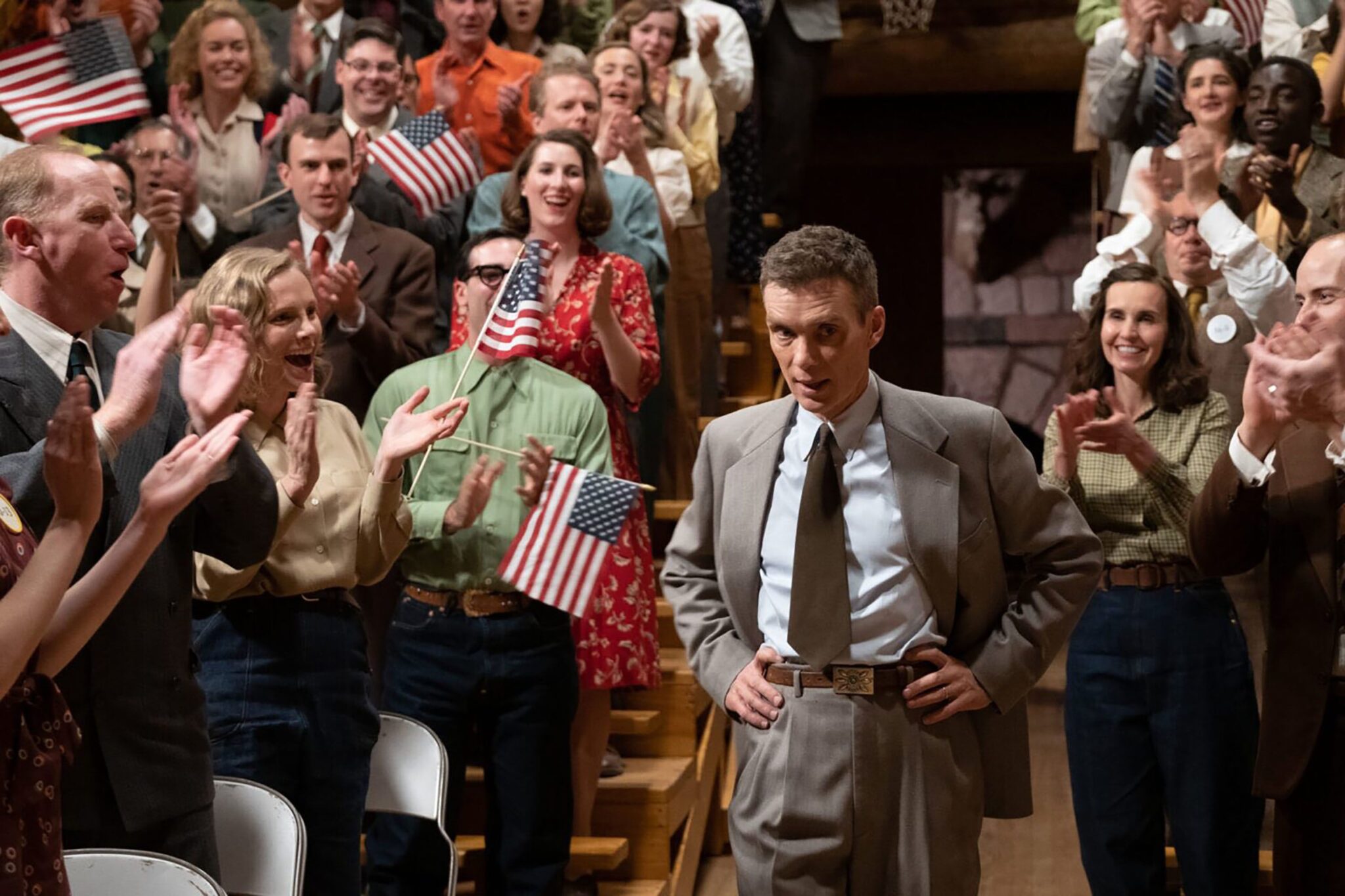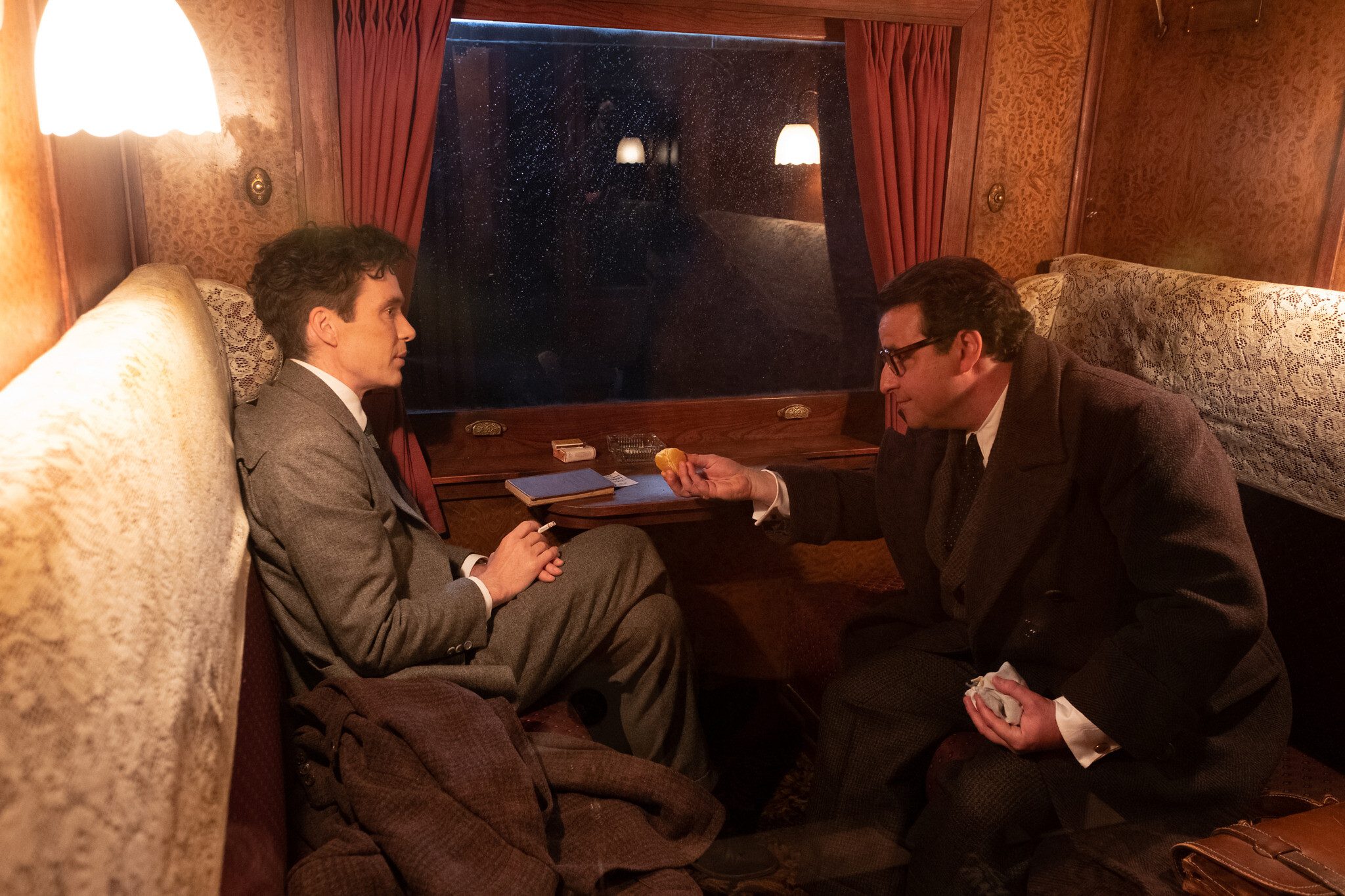For all his faults, Christopher Nolan is a gifted storyteller. Like a stage magician, he has a great patter in getting people psyched to see his movies. His latest trick, Oppenheimer a straightforward biopic shrouded under the guise of a Nolan spectacle-driven summer blockbuster.
The result is arguably his most mature work. Nolan wrote the script using the Pulitzer Prize-winning biography “American Promethus” by Kai Brid and Martin J. Sherwin as his source. He pulls off a neat hat trick of presenting Robert J. Oppenheimer (Cillian Murphy) without martyring him or canonizing him. Most impressively, despite how Nolan allows us to view Oppenheimer so nakedly, literally, and figuratively, we come away knowing precious little about the man.

Nolan gives us glimpses into Oppenhemier’s psyche, and we learn a great deal about his flaws and infidelities, but Nolan does in such a way as to be balanced. Murphy’s performance of a man gutted by regret and anxiety over the consequences of his action is mesmerizing. Hoyte van Hoytenma’s camera captures his increasingly hollowed-out facade with a sense of compassionate fury.
In this sense, the most impressive aspect of Oppenheimer is how the film doesn’t judge Oppenheimer, the man, but Nolan does. He does it in a multitude of ways; chief among theme is focusing on how Oppenheimer became a willing tool for the American military-industrial-complex only to find himself with that very same apparatus focused on him all mixed with his fellow scientists arguing about the moral and ethical implications of what exactly building the bomb means for the world.
What drives Oppenheimer are the many conversations from many different angles, as Nolan and van Hoytenma explore the rationalizations both Oppenheimer and the military spin out to justify their actions. The majority all-white cast, a Nolan staple, seems intentional in this case as the film subtly explores how whiteness and its ties to America’s patriotism often limit how we view non-Americans, white or not.
Nolan wisely doesn’t show the devastation of Hiroshima or Nagasaki. Instead, he shows Oppenheimer watching the footage of the destruction and the way the wages of his sins weigh upon him. The effect of the carnage is distressing, giving us a rare insight into his emotional state. In particular, in a scene in which he gives a speech just after the bomb has been dropped, he is racked with guilt and realization of the changing world. It is not only the film’s best scene but also Nolan’s best scene of his career thus far.
Even though his women are more fully realized than in his previous work, he still seems to struggle to conceive them as something beyond tropes and symbols. Still, in Oppenehiemer, they fare better than they usually do in Nolan films. They are still largely ciphers; they tend to be the holders of wisdom here. Emily Blunt, as Kitty, is an alcoholic, pragmatic, and ill-equipped to be a mother. She is also given the film’s thesis statement as she scolds her husband. “You don’t get to commit sin and then ask all of us to feel sorry for you when there are consequences.”
The women in Nolan’s Oppenheimer bucks against the trope of warmth and nurturing; they are as cold and pragmatic as Oppenheimer himself. The way women are allowed to be so multifaceted also allows Nolan to explore non-traditional relationships. Oppenheimer has several affairs, something that Kitty, while never condoning, seems resigned. His most frequent partner is the passionate but distant Florence Pugh’s, Jean Tatlock. A woman with mental health issues is upfront with Oppenheimer, and the two begin a doomed and torrid affair spanning years. Oppenheimer’s love for Jean differs from his love for Kitty, and Nolan, refreshingly, doesn’t judge.
Nolan presents Oppenheimer with an air of impartiality while cleverly also condemning the father of the atomic age but not without empathy. The film’s heart lies in David Krumholtz’s Isiodr Isaac Rabi, a physicist and friend of Oppenheimer. He is the soul and serves as the Jewish lens for the bomb. I can’t tell you how delighted I am to see two massive summer blockbusters with Rhea Perlman AND David Krumholtz talk about being spoiled. Rabi is the one who calls the bomb and the potential H-bomb a “weapon of terror” and a “tool for genocide,” words that Oppenheimer takes to heart as he sits by helplessly as the American military apparatus whirls to horrifying life around him.

Matt Damon’s Lt. Gen. Leslie Groves, the man who recruits and supervises Oppenheimer for the project, represents the ungainly U.S. government bureaucracy while serving as somewhat comical relief. Damon’s dry delivery seems almost jubilant next to the morose Oppenheimer. “You can’t put a price tag on this.” “Sure you can; just add up the bills.”
As the nazi threat is defeated, the red scare begins to blossom with as much heat as one of Oppenehiemer’s explosions, and he soon begins to doubt the wisdom of his actions. Nolan and his editor Jennifer Lame shrewdly dramatize this by utilizing time, cutting back and forth between the past and present, creating a parallel rhythm; each thread bounces off each other, building suspense.
Despite the typical Nolan structure, pivoting from the Trinity tests to the confirmation hearing of Lewis Strauss (Robert Downey. Jr.), one of the many people who feel slighted by Oppenheimer, the film has a dramatic and moral crescendo showing Nolan at the height of his craft. There’s nothing new being done here; it’s just the masterwork of a master technician.
And that’s the sleight of hand Nolan has achieved. In essence, Oppenehimer is a very stereotypical biopic right down to someone handing Oppenehimer a newspaper with the headline “Hitler Invades Poland.” The scene where Nolan introduces the iconic “I am death, destroyer of worlds,” a repeated line, is one of those hilarious and kind of inspired in a cheesy way-it’s a sex scene between Oppenheimer and Tatlock.
At the same time, Nolan does a beautiful job of de-compartmentalizing history. So often in biopics, we see one famous person, and they will meet another renowned person in passing. But in Oppenheimer, Nolan shows how these historical figures knew of each other and knew each other. Einstein (Tom Conti) was Oppenheimer’s neighbor and taught at Princeton at the same time he did. It’s Nolan’s way of deftly showing a collective, not an individual, makes history.
Ludwig Goransson’s score underlines and punctuates every emotion and dramatic theme. The music walks the thin line between being beautiful and vibrant while never being too noticeable. It’s another example of the craftsmanship on display.
Even in politics, Nolan seems to be taking a stand, showing a spine he has previously been hesitant to show. Communism and labor movements are depicted with a clear-eyed intent, with multiple discussions about idealism and realism while also understanding the historical context, then and now. This is still a Hollywood movie; I’m not saying Nolan has written a Communist Manifesto. Still, it is depicted with a level head befitting a Hollywood embroiled in a historic labor battle.
Granted, the strike happened after the release of Oppenheimer, but again, neither art nor myself live in a vacuum.

You can feel Nolan pushing himself with Oppenheimer, trying to grow beyond mere spectacle. No mean feat considering the main thrust of the film’s publicity is promising people a spectacle of an atomic bomb exploding. But the real spectacle is Oppenhimer’s regret and the dread that consumes him as he realizes how he has fundamentally changed the world.
Oppenheimer shows us that Christopher Nolan refuses to stay static as an artist. You can feel Nolan striving to grow, pushing up against his previous limitations. He doesn’t always succeed, but there’s an attempt.
Images courtesy of Universal Pictures
Have strong thoughts about this piece you need to share? Or maybe there’s something else on your mind you’re wanting to talk about with fellow Fandomentals? Head on over to our Community server to join in the conversation!

